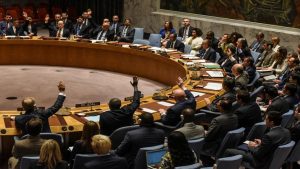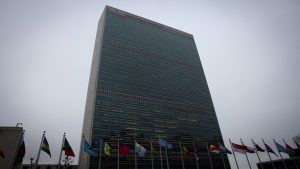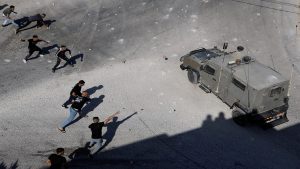A senior United Nations official has told the Security Council that tensions that have engulfed multiple countries continue to rise in the aftermath of the war in Gaza, as concerns about the risks of further escalation permeate the region.
Russia called the meeting after it condemned US strikes on alleged Iran-backed militant groups in Iraq and Syria in the aftermath of an attack that killed three US military personnel, injuring more than 30 in Jordan in late January.
Israel and Hezbollah continue to exchange fire across the Blue Line on an almost daily basis while ongoing Houthi drone and missile attacks on navigation in the Red Sea have seen the United States, the United Kingdom and their allies launch retaliatory strikes on Houthi positions in Yemen.
The United Nations Secretariat has repeatedly warned about the risks of further escalation and miscalculation that could have serious ramifications for the wider Middle East region.
Under-Secretary-General for Political and Peacebuilding Affairs Rosemary DiCarlo says, “The Secretary-General continues his extensive outreach to all key stakeholders to urge all parties to take concrete measures to de-escalate tensions and to work towards sustainable political solutions that aim to resolve, rather than merely manage longstanding conflicts. I appeal to the Council to continue to actively engage all concerned parties to prevent further escalation and the worsening of tensions that undermine regional peace and security.”
UNSC to meet at Russia’s request: Sherwin Bryce-Peace reports
Israel-Hamas war
Since the outbreak of the Israel-Hamas war on 7 October last year, Iraqi and Syrian militia groups with links to Iran have launched dozens of attacks on US military assets in the region, with the US launching retaliatory strikes that have caused dozens of casualties drawing condemnation from the countries directly impacted.
Russia has accused Washington of seeking to escalate tensions in the Middle East, labeling both their unilateral and bilateral actions as only worsening chaos in the region and nullifying international efforts to establish peace in the Middle East.
Moscow’s Ambassador Vasily Nebenzya calls on the international community to condemn these acts which violate the sovereignty of UN member states.
“The logic of their actions should be found only in the efforts at any price to preserve their dominating position in the world. Therefore, Washington has tried and will continue to try to fight fire with fire and compound the chronic disagreements within the Middle East to such an extent where it is for the benefit of the Israeli ally. We decisively condemn this new brazen act of aggression of the US against a sovereign state, creating further risks and increasing the level of instability in a region that is already on fire.”
The United States alternate Ambassador Robert A. Wood rejects Russia’s assertions, calling its actions consistent with international law and in the exercise of Washington’s inherent right to self-defence.
“Let me be clear. The United States does not desire more conflict in a region when we are actively working to contain and de-escalate the conflict in Gaza. And we are not seeking a direct conflict with Iran. But we will continue to defend our personnel against unacceptable attacks. Period. The US and coalition forces are deployed in our shared effort to ensure the enduring defeat of ISIS.”
The UK envoy Barbara Woodward indicates that her country’s actions in the Red Sea were designed to protect innocent lives and preserve the freedom of navigation for commercial shipping in the region.
“We acted alongside our US allies and with the support of many international partners in self-defense and in accordance with the rule of law. We are committed to working with all members of this council and the international community to protect international peace and security in the Middle East and throughout the world.”
The UN reiterates its call for an immediate humanitarian ceasefire in Gaza, warning that the Middle East would remain volatile without a clear political roadmap towards long-term stability






